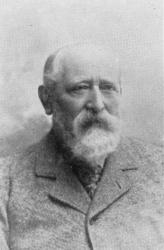Go Ad-Free
If you regularly use Hymnary.org, you might benefit from eliminating ads. Consider buying a Hymnary Pro subscription.

| Short Name: | Clarence Bicknell |
| Full Name: | Bicknell, Clarence, 1842-1918 |
| Birth Year: | 1842 |
| Death Year: | 1918 |
Clarence Bicknell (27 October 1842-17 July 1918) was a British amateur botanist, painter and archaeologist, with a doctorate in mathematics, and an Anglican priest (in Italy, from 1877 until he left the Church, date unknown). He was born in Herne Hill, England, on October 27, 1842, and died in Tenda (then in Italy, but since 1947 in France) on July 17, 1918.
Arriving in Italy in 1877 to work as an Anglican vicar, he built a museum ("Museo Biblioteca Clarence Bicknell") in Bordighera to house his botanical and archaeological collections. He became noted for his identification of the plants and petroglyphs of the Ligurian Riviera. His writings included Flowering Plants of the Riviera and Neighboring Mountains (1885) and Guide to the Prehistoric Rock Engravings of the Italian Maritime Alps (1913). In addition to his own museum, his collections were archived at the University of Genoa.
A Volapükist, he left that language for Esperanto in 1897. He attended the first international Esperanto convention, at Boulogne-sur-mer, France, in 1905. He produced a number of hymns that are still in use (seven translations and one original in Adoru Kantante (1971), and nine texts in Adoru (2001). He was active in work on behalf of the blind, and transcribed many Esperanto books into braille. In addition to his hymnic work, he wrote many original poems in, and translated secular poetry into, Esperanto, including Macaulay's "Horacio", 1906; Tennyson's "Gvinevero", 1907; pieces by Sturgis; Giacosa's "Ŝakludo", 1915. He also provided monetary support to many Esperanto activities, and founded and led until his death the local Esperanto club in Bordighera.
Regrettably, the date, reason, and nature of his "leaving the church" is not explained in the sources consulted (mainly the English, Italian, and Esperanto Wikipedias and the author indexes of the Esperanto hymnals).
See also http://www.clarencebicknell.com/index.php?option=com_content&view=article&id=16&Itemid=157&lang=en at clarencebicknell.com, the website of the Clarence Bicknell Association.
Leland Bryant Ross
| Texts by Clarence Bicknell (21) | As | Authority Languages | Instances |
|---|---|---|---|
| Ĉar Dio, la Paŝtisto mia | Clarence Bicknell (Author) | Esperanto | 3 |
| Dio de l' viv', de nia savo, Dio! | Clarence Bicknell (Translator) | Esperanto | 2 |
| El multaj landoj kaj nacioj | Clarence Bicknell (Author) | Esperanto | 2 |
| En la reĝa Betlehemo | Clarence Bicknell (Translator) | Esperanto | 2 |
| Estro de l'vivo, Ĉiopova Dio! | Clarence Bicknell (Translator) | Esperanto | 5 |
| Feliĉe kuŝis la naŭdek naŭ | Clarence Bicknell (Translator) | Esperanto | 3 |
| Haleluja! Haleluja! Dion laŭdu ĉiu kor' | Clarence Bicknell (Translator) | Esperanto | 2 |
| Ho anĝeloj, la Sinjoron adoradu en ĉiel' | Clarence Bicknell (Translator) | Esperanto | 12 |
| Ho! Dio ĉiopova, vivofonto! | Clarence Bicknell (Author) | Esperanto | 2 |
| Al Vi, Sinjoro, estu honoro, laŭdo, glor' | Clarence Bicknell (Translator) | Esperanto | 3 |
| Ho! kiel dolĉe al orelo | Clarence Bicknell (Translator) | Esperanto | 2 |
| Ho! Kreinto de l' homaro! | Clarence Bicknell (Author) | Esperanto | 2 |
| Ho Patro Di', mi vagas malproksime | Clarence Bicknell (Translator) | Esperanto | 2 |
| Ho! triumfa Pask-tagiĝo | Clarence Bicknell (Translator) | Esperanto | 3 |
| La tago releviĝa! Ho mond' kun laŭta kri' | Clarence Bicknell (Translator) | Esperanto | 2 |
| “Laculoj, al Mi venu | Clarence Bicknell (Translator) | Esperanto | 2 |
| Nun estu Di' laŭdata | C. Bicknell (Translator) | Esperanto | 3 |
| Patro nia, ni alvenis | Clarence Bicknell (Author) | Esperanto | 3 |
| Per unu kor' kaj lingvo, bona Di' | Clarence Bicknell (Author) | Esperanto | 2 |
| Reĝeco Dia venu | Clarence Bicknell (Translator) | Esperanto | 2 |
| Sanktuloj sur la tero kantu | Clarence Bicknell (Translator) | Esperanto | 2 |